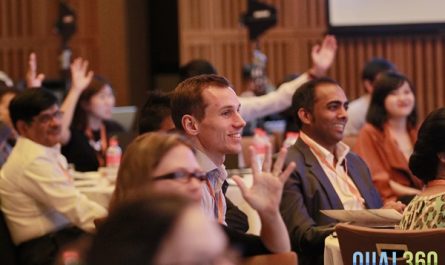In the lead up to our Qual360 2024 tour we are re-living the best of 2023. One of the highest rated presentations by our audience was given by Monica Dreger from Airbnb.
Delivering answers not insights: Making qualitative findings actionable
- Analyzing how the data driven environment is becoming more disconnected from humans
- Building the research function and gaining stakeholders trust: Creating a team of specialist to deliver true human understanding
- Transforming from consumer insights to strategic insights: Developing the right structure with strategic and tactical research
- Shifting the approach from research as an outcome to research as a tool
Monica Dreger, Global Head of Strategic Insights and Foresights, Airbnb
You can find all Qual360 conference recordings for free in our video section!
Video transcript below (This is an AI generated summary. There may be inaccuracies.)
Delivering answers not insights: Making qualitative findings actionable
Monica Dreger shares her experience as a psychologist who later became a researcher at Airbnb. She discusses how her background in advertising and market research made him vulnerable to making qualitative findings actionable. She also discusses how Airbnb is constantly evolving and changing, and her job is to understand why people do what they do and keep up with the changing times.
Moving on to insights research, the speaker discusses how over time insights have come to focus on questions rather than finding the right answers. They discuss the team approach to problem-solving at Airbnb, emphasizing the importance of empathy, creativity, and personal growth. They highlight how qualitative research is becoming more important in the industry as demand for real-time research automation and machine learning data increases. Finally, the speaker expresses their optimism about the future of the industry and the importance of asking hard questions to understand the underlying motives of leaders.
In this section, the speaker discusses the evolution of insights and their impact on asking the right questions. They start with insights from the 1940s, highlighting the discovery of focus groups and the use of motivation research to understand consumer behavior. Moving on to the era of big data and analytics, the speaker talks about the discovery of market research analysis software which focused on the use of analytics to understand the world’s future. Finally, the speaker reflects on the current era, where the business of research is focused on change and adapting to a volatile, uncertain world, where nothing is predictable.
Monica discusses the importance of understanding and embracing the current VUCA (volatile, uncertain, complex, and ambiguous) environment in order to be successful in research. She acknowledges that the future is uncertain and that technology is rapidly changing, but emphasizes that human psychology and behavior are still crucial elements in research. The speaker suggests using AI and automation to enhance research, but emphasizes that human insight and storytelling are still necessary at the end of the process. Dreger encourages researchers to embrace their role as researchers and put themselves out there, regardless of whether their work involves research or not. She also emphasizes that human judgment and point of view are essential in the current VUCA environment.
Next, Monica covers the importance of asking hard questions to deliver actionable insights at Airbnb. She mentions the need to challenge assumptions and perspectives and to embrace discomfort and adversity to arrive at the right answers. Monica also discuss the team approach to delivering answers and the value of bringing a diverse set of skills to the table, including different perspectives and disciplines. It is also important to think outside the box and to find new ways to approach problems, which has been key to the success of Airbnb’s insights team.
So how does the research team Airbnb look like and what is their approach to problem-solving? The team is diverse, with members from different fields such as design, anthropology, behavioral economics, psychology, statistics, neuroscience, AI, and more. The team comes at problems from different perspectives and skills, and they collaborate to find solutions. The team’s approach involves initial desk research to understand the current context and then exploring different questions and skill sets. Systems thinking is emphasized, and empathy is introduced to consider the human aspect of things. Creativity is also important in developing useful answers that reach the right person at the right time.
The Airbnb research team is made up of professionals with 14 different roles, but they have a combined 170 years of experience. They lean on their partners for data insights and effective business empathy. Thought leadership is also important in choosing the right projects to work on, and building strong relationships and effective influencing skills are highly valued.
Airbnb implemented a number of initiatives to build trust within their team and stakeholders in order to acquire hosts. One way they did that was by conducting research to understand their hosts better and how they reached the platform. They used various methods including web scraping, conventional research, and AI to identify the big questions that potential and prospective hosts didn’t know but didn’t know enough to ask. They then showed videos of people having an “aha moment” when they realized they could become a host, which became part of their influencing storytelling.
Another initiative was to use AI in combination with conventional research and the work of a neuroscientist to understand the journey of traveling and how the brain uses different neural components. The team realized that the same light neural landscape that happens when people are inspired by something else also happens when they are inspired by travel. They then used the insight to understand how inspiration is important in the booking stage and went back to consumers to measure their happiness in different stages of the journey. Overall, these initiatives were successful and led to the creation of the AB Campaign, which became a big aha moment for the company.
Monica closes by discussing the importance of qualitative research in the industry and how it will become more crucial in the future due to the increased demand for real-time research automation, AI learning, and machine learning data. She is confident in the future of the industry and believes that bringing in the human element will be more important than ever before. Asking the hard questions, such as “why” questions, to get to the root of the problem and understand the underlying motives of leaders will remain one key task. Leaders need to open up and realize that they may have questions to consider themselves.









 by
by 

